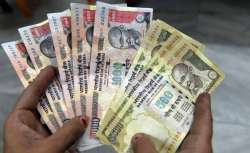No grace period to exchange demonetised notes, Govt tells SC
The government would not extend the period to exchange demonetised currency notes of Rs 1,000 and Rs 500 will be granted, the Supreme Court was informed on Friday.

The government would not extend the period to exchange demonetised currency notes of Rs 1,000 and Rs 500, the Supreme Court was informed on Friday.
In its affidavit filed in the apex court, the Centre said that it has taken a "conscious decision" not to extend the period beyond December 30 last year for exchanging the demonetised currency notes of Rs 1,000 and Rs 500 unlike for NRIs which ended on March 31.
The government said it was not legally bound to come out with a fresh notification to grant grace period or window for depositing scrapped currency notes.
It also gave details about the raids and recoveries made by law-enforcing agencies during and after the demonetisation period claiming that undisclosed income of over Rs 5,400 crore was detected.
"It is most humbly submitted that the central government took a conscious decision that no necessity or any justifiable reason exists either in law or on facts to invoke its power under section 4(1)(ii) of the Ordinance to entitle any person to tender within the grace period the specified bank notes," the government said in its affidavit.
The affidavit was filed in response to petitions by private individuals and a firm seeking a window like those given to NRIs and people who were abroad during the period of demonetisation to deposit the scrapped currency notes with the Reserve Bank of India.
The Centre contended that the pleas in this regard were "not maintainable" as "no mandamus lies against the government for enforcing a legislative activity" and the petitioners "cannot claim any right since there is no estoppel against statute".
"There is no legal duty cast upon the government to issue any notification extending the grace period. Equally, the petitioner has no legal right to claim grace period," it said.
The Centre made it clear that as per last year's November 8 notification, the demonetisation period was between November 9 to December 30 last year within which primarily, the exchange and deposit of specified bank notes was permitted to every person subject to meeting the laid down norms.
"In other words, what was permitted was exchange and or deposit of specified bank notes during a block period, a period up to and including December 30, 2016," it said, adding that the "use of word 'shall' in the notification is not determinative of any such right in as much as it was only an enabling provision to enable the central government to meet any unforeseen or sudden contingencies that may arise during the period of demonetisation".
"Therefore, the use of word 'shall' necessarily read as 'may' and it did not impose any legal obligation on the Central Government," the affidavit said.
The Centre also made reference of "various malpractices" which came into fore post demonetisation, including use of old currency notes for buying gold.
"Between November 9, 2016 and January 10, 2017 alone, there were more than 1100 raids/surveys conducted by Income Tax Department on various persons. During the same period, i.e., between November 9, 2016 and January 10, 2017, more than 5,100 notices were issued for verification of high value suspicious cash deposits made in bank accounts," it said.
"As a result of the raids and other strict measures enforced, more than Rs 610 crore in cash (including cash of Rs 513 crore out of which Rs 110 crore was in new currency) and valuables were seized by the IT Department and other government agencies. The undisclosed income detected in the above actions was more than Rs 5,400 crore," the affidavit said.
It said that out of 1,100 raids and surveys, more than 400 cases were referred to the Enforcement Directorate and the CBI for further action in accordance with law.
"Accordingly, it was decided as a matter of conscious decision and as a major economic step to bring in an Ordinance known as 'The Specified Bank Notes (Cessation of Liabilities) Ordinance, 2016 since the Parliament was not in session on December 30, 2016," it said.
The government also submitted that after demonetisation period was over, the IT department initiated "operation clean money" on January 31 to leverage technology and data analysis for e-verification of cash deposits made during that period.
"The exercises have resulted in identification of approximately 18 lakh persons for such online verification, who appeared to be not in line with tax payer's profile. At present, more than 12 lakh online responses from 8.38 lakh distinct PANs/persons have already been received.
"It is submitted that in case there has been due explanation the verifications are being closed after proper analysis and examination. Similarly, where there has been deposits made in Pradhan Mantri Garib Kalyan Yojna (PMGKY) then also the verifications are being closed.
"It is further submitted more than 3.78 lakh out of approximately 18 lakhs, high risk cases have been detected and have been taken up for assessment and investigation," it said.
(With PTI inputs)